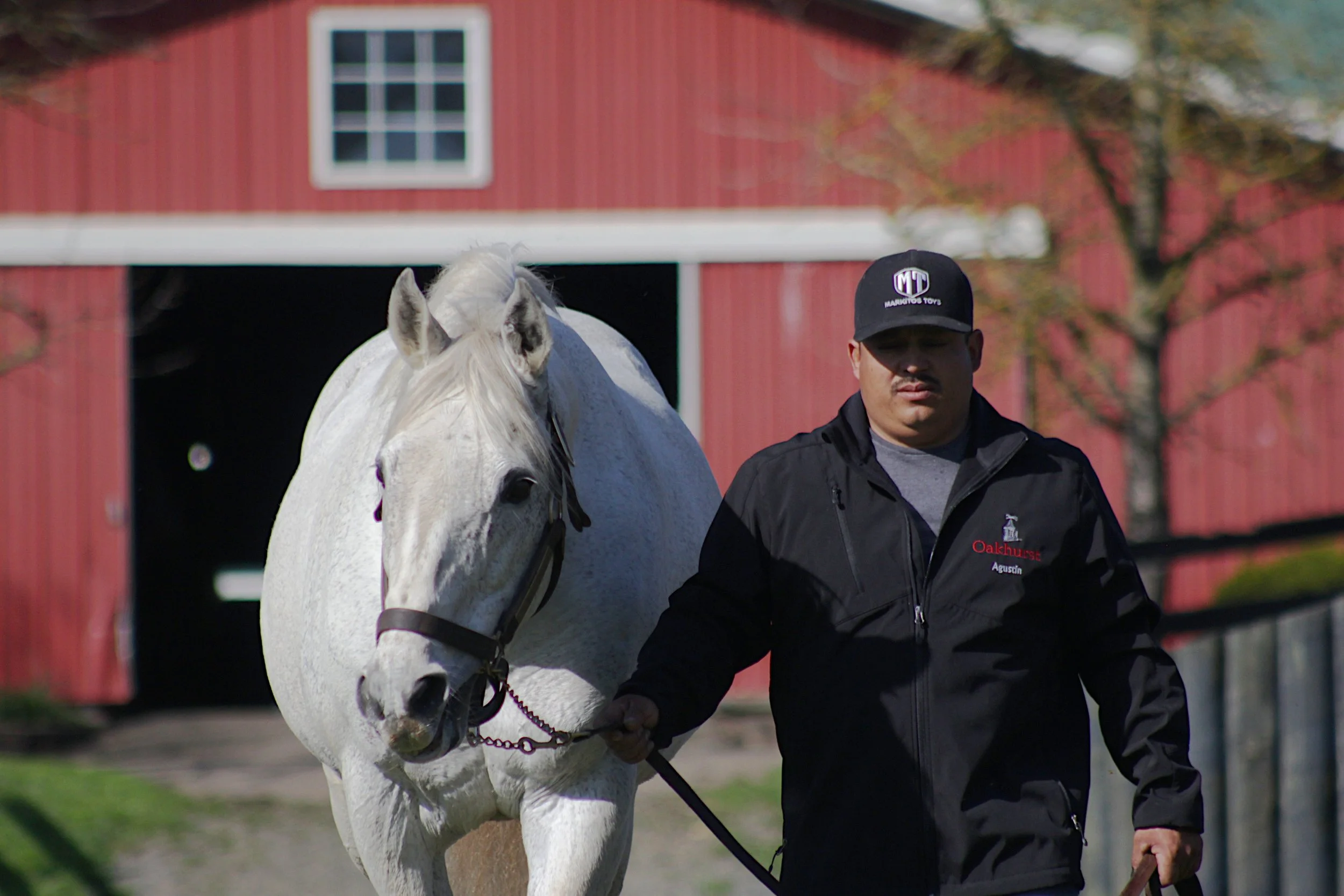
Oakhurst Equine
Beyond the Fences Blog
Colic in Horses: What It Is, What to Watch For, and When to Call the Vet
Equine colic is one of the leading causes of emergency calls to equine veterinarians and a major concern for horse owners. Colic in horses simply means abdominal pain, but the causes and severity can vary widely, from mild gas colic to surgical colic requiring immediate intervention. Early recognition of colic symptoms by attentive horse owners and timely veterinary treatment are key factors in improving outcomes.
Using the Sleip® Motion Analysis System in Lameness Exams at Oakhurst Equine Veterinary Services
At Oakhurst Equine Veterinary Services, we are able to use Sleip as part of our comprehensive equine lameness exams to provide precise, objective gait analysis for sport horses, performance horses, and pleasure horses alike. Sleip’s advanced video-based technology analyzes movement without the need for wearable sensors or wireless devices, allowing horses to move naturally while we evaluate subtle gait asymmetries. By integrating Sleip with thorough physical exams, diagnostic imaging, and our veterinarians’ expertise in equine sports medicine and lameness, Oakhurst can deliver accurate diagnoses, measurable progress tracking, and customized treatment plans that support long-term soundness and performance.
Foaling Season at Oakhurst: Supporting Mares and Foals from Birth Forward
Foaling season is an exciting and high-stakes time for mare owners, breeders, and farms, and at Oakhurst Equine Veterinary Services, preparation is key to a safe and successful outcome. Proper foaling management, experienced equine veterinary care, and a well-supervised foaling farm can significantly reduce risks for both mare and foal. Whether you are preparing for your first foal or managing multiple broodmares, our team is here to support you through every stage of equine reproduction, from late-term pregnancy to healthy newborn care.
Humans and Horses Through History: Partners in the Advancement of Civilization
For thousands of years, horses and humans have shared a powerful partnership that helped shape civilization as we know it. From early survival and agriculture to transportation, warfare, sport, and modern companionship, the history of horses in human civilization is deeply intertwined with our own. In this article, we explore how the horse influenced human progress—and why this extraordinary bond continues to matter today, especially in the world of equine care, sport, and veterinary medicine.
A Look Inside Oakhurst Equine—and What Makes Us Different
At Oakhurst, we’re more than an equine practice—we’re a community built around quality care, hard work, and genuine passion for horses. Every part of our operation reflects that commitment. If you are an equine doctor that shares that drive and loves the equine world, check us out — you might be the perfect addition to our team!
Discover Oakhurst Equine & Thoroughbred Farm from Above
Experience Oakhurst Equine Veterinary Services and Oakhurst Thoroughbred Farm from above — a premier Oregon horse farm for equine veterinary care, breeding, and performance in the Willamette Valley.
Blog Series: A Different Kind of Equine Veterinary Career - Part 4
Life in Oregon and the Pacific Northwest comes with a rhythm all its own—where seasons are bold, landscapes are diverse, and opportunity feels endless. It’s a place where mountains, rivers, forests, and coastlines meet thriving towns and cities, offering both adventure and connection. Whether you’re drawn by the lifestyle, the scenery, or the people, the Northwest has a way of making you feel like you truly belong.
Blog Series: A Different Kind of Equine Veterinary Career - Part 3
Behind every great practice is an even greater team—meet the people who make Oakhurst feel like home.
Blog Series: A Different Kind of Equine Veterinary Career - Part 2
Curious what it actually feels like to work here? Let’s walk through a typical day in the life of an Oakhurst associate.
Blog Series: A Different Kind of Equine Veterinary Career - Part 1
Welcome to our blog series designed for equine veterinarians who want more out of their careers. We know the profession is changing—and we’re not like every other practice. In each post, we’ll show you how we do things differently and why joining our team might be the fresh start you’ve been looking for.
What to Know About Your Equine Emergency Veterinarians
When a horse emergency happens, it’s sudden, stressful, and overwhelming. In those moments, your equine emergency veterinarian becomes your horse’s lifeline — and yours. Whether it’s colic, a laceration, severe lameness, or foaling complications, knowing who to call and what to expect can make all the difference.
Equine Sarcoids Explained
Sarcoids are one of the most common skin tumors seen in horses, and while they’re typically non-life-threatening, they can be persistent, frustrating, and difficult to manage. These tumors often return after treatment and can appear in new locations, making them a challenge for both horse owners and veterinarians. In this blog, we’ll explore what sarcoids are, how to recognize them, and why early diagnosis and a consistent treatment strategy are essential for keeping your horse comfortable and healthy
Insulin Resistance (IR) in Horses: What It Is and How to Manage It
Insulin resistance (IR) in horses can lead to obesity and laminitis. It's caused when the body doesn't respond properly to insulin, leading to high blood sugar and fat storage. In this blog, we’ll discuss how to spot the early signs of IR and how to manage it for a healthier horse.
Lighting the Way to a Successful Equine Breeding Season: Tips from Oakhurst Equine Veterinary Services
Equine reproduction is one of the most fascinating and vital aspects of equine care. Whether you’re an experienced breeder or new to the world of horses, understanding the basics of equine reproduction is key to ensuring the health and success of both mare and foal. From managing mare cycles to selecting stallions and navigating the intricacies of pregnancy and foaling, every step requires knowledge, preparation, and attention to detail.
Joys of Becoming an Equine Veterinarian!
If you have a passion for horses and are pursuing a career in veterinary medicine, becoming an equine veterinarian offers an incredibly fulfilling path. This career combines diverse medical challenges with meaningful connections to both horses and the people who care for them.
Equine Endocrine: Understanding Pituitary Pars Intermedia Dysfunction (PPID) often, but improperly called Equine “Cushing's Disease”
PPID is a common endocrine disorder primarily affecting older horses. It is caused by changes in the pituitary gland, leading to overproduction of certain hormones, particularly adrenocorticotropic hormone (ACTH). Proper management and veterinary care are essential for improving the quality of life and longevity of horses with PPID.
The Importance of IgG Testing in Foals/Plasma Administration
IgG testing in foals is crucial for evaluating passive transfer of maternal antibodies, ensuring proper immune protection and reducing the risk of infectious diseases in the early stages of life. Plasma is important in foals with low IgG levels as it provides a vital source of antibodies, aiding in the passive transfer of immunity and reducing the vulnerability to infectious diseases.
Don't Forget About the Donkeys (and Mules)!
While they have faithfully served various human needs, it's essential to remember that donkeys and mules, like any other animals, require regular attention to ensure their well-being. By prioritizing their health through routine veterinary check-ups and proper maintenance, we can continue to benefit from the unwavering companionship and dedicated work these remarkable creatures offer.
Guiding the Future Generation of Equine Veterinarians: Fostering Passion and Expertise
Addressing the critical shortage of equine veterinarians, it becomes paramount to invest in cultivating the passion and talents of dedicated young individuals who are drawn to the field of veterinary medicine by their deep admiration for these magnificent animals.
Equine Disasters and Emergencies - Readiness Kits Can Be a Crucial Lifesaving Resource
Having a readiness kit for your horse is essential to ensure their safety and well-being during unexpected emergencies, providing necessary supplies and peace of mind until you can find help.




















